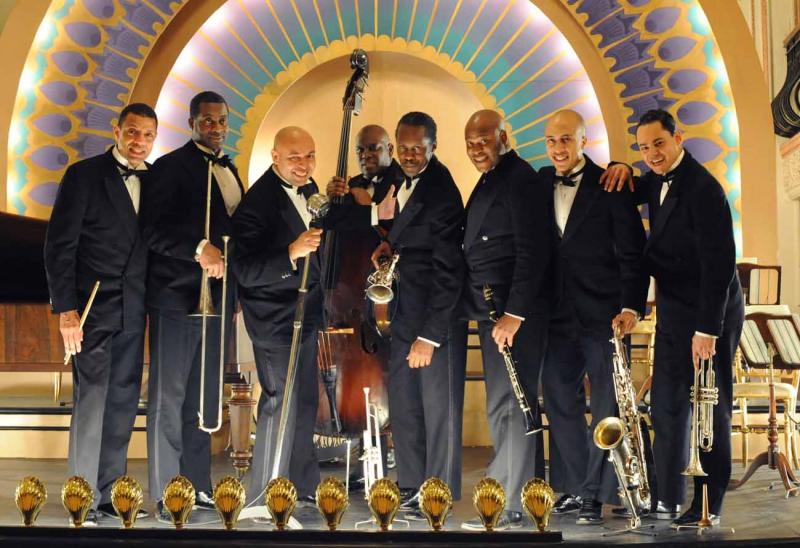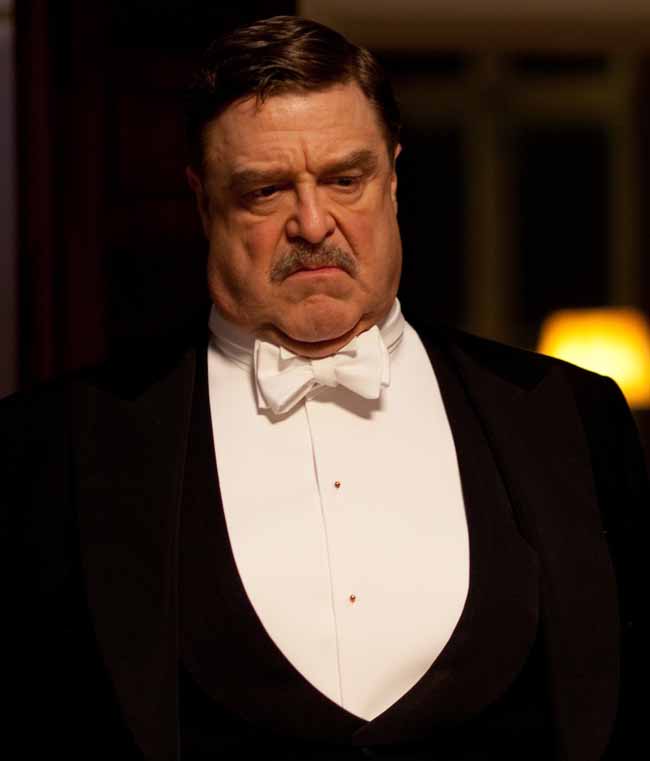Dancing on the Edge, Series Finale, BBC Two | reviews, news & interviews
Dancing on the Edge, Series Finale, BBC Two
Dancing on the Edge, Series Finale, BBC Two
Poliakoff's slow-burner about jazz and high society goes out with a bang

Stephen Poliakoff's slow-burning drama had turned into a propulsive whodunnit by this final episode, hurtling towards a resolution with panache and surprise. The five-part mini-series about a black jazz band in early 1930s high society has had the feel of an exploratory score at times. With syncopated beats and riffs decorating its unfolding narrative, the occasional scene and detail has seemed superfluous. But Poliakoff has had his reasons.
This episode juggled the escape of innocent band leader and murder suspect, Louis (Chiwetel Ejiofor), to safety from the police, alongside the search for the real killer. As Stanley (Matthew Goode), ever the dashing hero, helped Louis to hide, suspicion gathered around other characters. Masterson (John Goodman, pictured below), the wealthy American, looked increasingly shifty, buying up Stanley's music magazine with Lavinia (Jacqueline Bisset), the part-time recluse, and lavishing positions and gifts on everyone. He had already been implicated in the beating-up of a young girl. But was it him? Sarah (Janet Montgomery), the photographer, suggested he was protecting Julian. But why? It was Lavinia who came up with an answer: Masterson had homoerotic feelings for his young employee. More scandal!
 The characters finally revealed their depths and their flaws. Sarah, Louis's loyal lover, gave the police a lead to help find him, while Pamela, the It girl, demonstrated surprising concern and ingenuity as a member of the fugitive party. Prejudices surfaced with alarming speed, with the apparently open-minded Lavinia deciding that tragedy was "the likely outcome" of society accepting "a negro band".
The characters finally revealed their depths and their flaws. Sarah, Louis's loyal lover, gave the police a lead to help find him, while Pamela, the It girl, demonstrated surprising concern and ingenuity as a member of the fugitive party. Prejudices surfaced with alarming speed, with the apparently open-minded Lavinia deciding that tragedy was "the likely outcome" of society accepting "a negro band".
Julian (Tom Hughes) became even more - and quite brilliantly - strange. Rather than mourning Jessie, he thought about shoes: he must get new ones so that people would think he was important. There were telling clues (on more familiar Poliakoff territory) as to why he might be unhinged: he grew up with an anti-Semitic, uncaring mother. When Julian found a gun in his house, it was a clear sign that he was the killer. To unsettle Masterson, Julian took him out for bangers and mash, and shot himself. Hughes's performance was spectacular, revealing glints of turmoil behind a boyish exterior - he's a talent to watch. As for Louis, he and the band eventually caught a train to Dover, and soon Louis was looking as composed as ever, drinking in Marseille on the way to the US.
The final episode boasted cinematic photography and plenty of swishing gowns and three-piece suits (essential wear even if you're going to be spending the day in a damp basement with a runaway), soundtracked by the warming songs of the jazz band alternating with a barrage of strings for the tense moments. In Dancing on the Edge, Poliakoff has constructed a believable world, spanning turbulent class divides, and has shown how breaking convention (and the march of progress) come at the risk of losing the safety and comfort of the old ways. With so many ideas here, surely no-one could now accuse this writer of being slow to tell a story.
- The final episode of Dancing on the Edge is repeated at 22.30 on Sunday on BBC Two
Add comment
The future of Arts Journalism
You can stop theartsdesk.com closing!
We urgently need financing to survive. Our fundraising drive has thus far raised £49,000 but we need to reach £100,000 or we will be forced to close. Please contribute here: https://gofund.me/c3f6033d
And if you can forward this information to anyone who might assist, we’d be grateful.

Subscribe to theartsdesk.com
Thank you for continuing to read our work on theartsdesk.com. For unlimited access to every article in its entirety, including our archive of more than 15,000 pieces, we're asking for £5 per month or £40 per year. We feel it's a very good deal, and hope you do too.
To take a subscription now simply click here.
And if you're looking for that extra gift for a friend or family member, why not treat them to a theartsdesk.com gift subscription?
more TV
 theartsdesk Q&A: director Stefano Sollima on the relevance of true crime story 'The Monster of Florence'
The director of hit TV series 'Gomorrah' examines another dark dimension of Italian culture
theartsdesk Q&A: director Stefano Sollima on the relevance of true crime story 'The Monster of Florence'
The director of hit TV series 'Gomorrah' examines another dark dimension of Italian culture
 The Monster of Florence, Netflix review - dramatisation of notorious Italian serial killer mystery
Director Stefano Sollima's four-parter makes gruelling viewing
The Monster of Florence, Netflix review - dramatisation of notorious Italian serial killer mystery
Director Stefano Sollima's four-parter makes gruelling viewing
 The Diplomat, Season 3, Netflix review - Ambassador Kate Wyler becomes America's Second Lady
Soapy transatlantic political drama keeps the Special Relationship alive
The Diplomat, Season 3, Netflix review - Ambassador Kate Wyler becomes America's Second Lady
Soapy transatlantic political drama keeps the Special Relationship alive
 The Perfect Neighbor, Netflix review - Florida found-footage documentary is a harrowing watch
Sundance winner chronicles a death that should have been prevented
The Perfect Neighbor, Netflix review - Florida found-footage documentary is a harrowing watch
Sundance winner chronicles a death that should have been prevented
 Murder Before Evensong, Acorn TV review - death comes to the picturesque village of Champton
The Rev Richard Coles's sleuthing cleric hits the screen
Murder Before Evensong, Acorn TV review - death comes to the picturesque village of Champton
The Rev Richard Coles's sleuthing cleric hits the screen
 Black Rabbit, Netflix review - grime and punishment in New York City
Jude Law and Jason Bateman tread the thin line between love and hate
Black Rabbit, Netflix review - grime and punishment in New York City
Jude Law and Jason Bateman tread the thin line between love and hate
 The Hack, ITV review - plodding anatomy of twin UK scandals
Jack Thorne's skill can't disguise the bagginess of his double-headed material
The Hack, ITV review - plodding anatomy of twin UK scandals
Jack Thorne's skill can't disguise the bagginess of his double-headed material
 Slow Horses, Series 5, Apple TV+ review - terror, trauma and impeccable comic timing
Jackson Lamb's band of MI5 misfits continues to fascinate and amuse
Slow Horses, Series 5, Apple TV+ review - terror, trauma and impeccable comic timing
Jackson Lamb's band of MI5 misfits continues to fascinate and amuse
 Coldwater, ITV1 review - horror and black comedy in the Highlands
Superb cast lights up David Ireland's cunning thriller
Coldwater, ITV1 review - horror and black comedy in the Highlands
Superb cast lights up David Ireland's cunning thriller
 Blu-ray: The Sweeney - Series One
Influential and entertaining 1970s police drama, handsomely restored
Blu-ray: The Sweeney - Series One
Influential and entertaining 1970s police drama, handsomely restored
 I Fought the Law, ITVX review - how an 800-year-old law was challenged and changed
Sheridan Smith's raw performance dominates ITV's new docudrama about injustice
I Fought the Law, ITVX review - how an 800-year-old law was challenged and changed
Sheridan Smith's raw performance dominates ITV's new docudrama about injustice
 The Paper, Sky Max review - a spinoff of the US Office worth waiting 20 years for
Perfectly judged recycling of the original's key elements, with a star turn at its heart
The Paper, Sky Max review - a spinoff of the US Office worth waiting 20 years for
Perfectly judged recycling of the original's key elements, with a star turn at its heart

Comments
Afraid I must agree with the
I can never understand when
I'm generally quite partial
After a really intriguing and
I thought this was a very
This was Gosford Park without